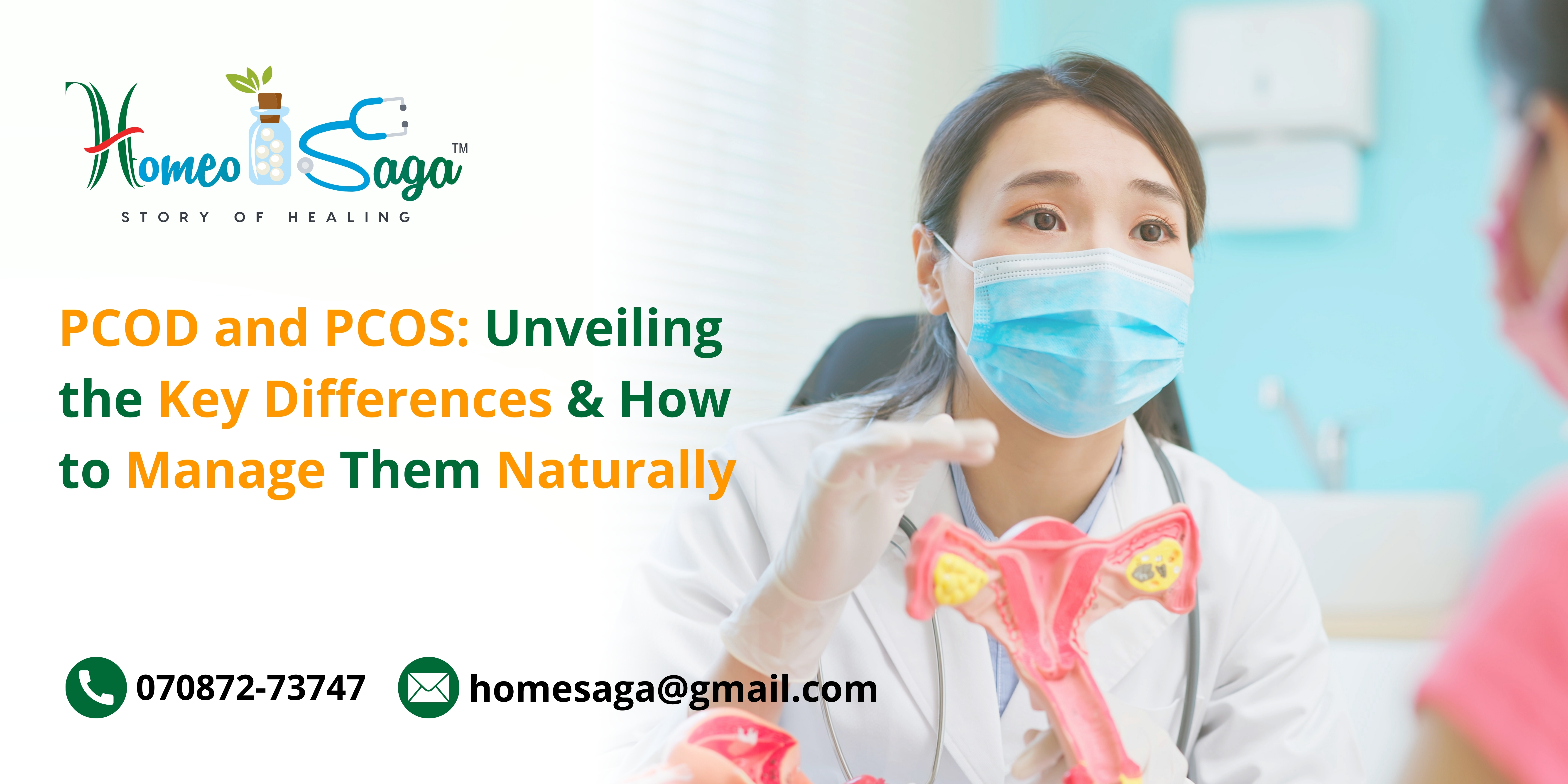PCOD and PCOS: Unveiling the Key Differences & How to Manage Them Naturally
- Category: all
- Date: 08-10-2024
Many women confuse PCOD (Polycystic Ovarian Disease) with PCOS (Polycystic Ovary Syndrome), but these two conditions are distinct in their causes, severity, and treatment approaches. Both conditions are related to hormonal imbalances and affect the ovaries, but understanding the differences is crucial for effective management and treatment. In this blog, we’ll explore what makes PCOD and PCOS unique and how you can approach treatment for each condition.
What is PCOD?
PCOD is a condition in which the ovaries release immature or partially mature eggs over time. These eggs develop into cysts and enlarge the ovaries, leading to a hormone imbalance, particularly the overproduction of androgens (male hormones). PCOD is more of a lifestyle-related condition that can be controlled with modifications in diet, exercise, and stress management.
Symptoms of PCOD:
Irregular menstrual cycles
Weight gain or difficulty losing weight
Excessive hair growth (hirsutism)
Acne or oily skin
Infertility challenges
What is PCOS?
PCOS is a more severe endocrine disorder, where the ovaries produce excessive amounts of male hormones, causing irregular or absent ovulation. This imbalance not only affects the reproductive system but also increases the risk of metabolic disorders like diabetes, heart disease, and more.
Symptoms of PCOS:
Irregular or absent menstrual periods
Difficulty conceiving due to lack of ovulation
Significant weight gain, particularly around the abdomen
Severe acne and oily skin
Excessive hair growth on the face and body (hirsutism)
Scalp hair thinning
Differences Between PCOD and PCOS
Underlying Cause:
PCOD: Triggered by lifestyle factors such as poor diet, lack of exercise, and stress. It often improves with lifestyle changes.
PCOS: A complex metabolic condition that involves insulin resistance and excessive androgen production. It’s more challenging to manage and can have long-term health impacts.
Health Risks:
PCOD: This condition is less likely to cause serious health risks and is usually manageable with proper diet and lifestyle adjustments.
PCOS: Can lead to more serious complications, including diabetes, cardiovascular diseases, and difficulty conceiving.
Fertility:
PCOD: Ovulation is irregular, but pregnancy is still possible with minimal medical intervention.
PCOS: Ovulation is often severely impaired, and many women with PCOS require fertility treatments to conceive.
Severity:
PCOD is generally less severe and does not necessarily impact overall health if managed properly.
PCOS is more serious and often requires long-term medical treatment and monitoring to prevent metabolic complications.
How to Treat PCOD and PCOS
Treating PCOD:
PCOD is primarily managed through lifestyle changes:
Diet: Focus on a balanced, low-glycemic diet rich in whole foods.
Exercise: Regular physical activity to improve metabolism and manage weight.
Stress Management: Techniques like yoga and meditation can help regulate hormonal imbalances.
Treating PCOS:
PCOS treatment usually requires a combination of lifestyle changes and medical treatments:
Medications: Doctors may prescribe hormonal birth control, insulin-sensitizing agents, or medications like metformin to control symptoms.
Fertility Treatments: If pregnancy is a goal, fertility treatments like ovulation induction may be necessary.
Diet and Exercise: A low-carb diet and regular exercise can help manage weight and improve insulin sensitivity.
TheHomeoSaga’s Holistic Approach to PCOD and PCOS
At TheHomeoSaga, we offer a unique, individualized approach to treating both PCOD and PCOS through safe and natural homeopathic remedies. Our treatments focus on balancing the body's hormones naturally without the need for invasive procedures or heavy medications. Whether you’re struggling with irregular periods, fertility issues, or metabolic concerns, TheHomeoSaga provides holistic solutions tailored to your specific condition.
By addressing the root cause of hormonal imbalances, TheHomeoSaga helps restore regular ovulation, reduce symptoms like weight gain and acne, and improve fertility naturally. With years of expertise in treating complex chronic conditions like PCOD and PCOS, we aim to offer our patients a healthier, more balanced life.
Conclusion
Understanding the difference between PCOD and PCOS is vital for determining the right treatment approach. While PCOD can often be managed with lifestyle changes, PCOS may require a more comprehensive treatment plan to avoid long-term health risks. If you are struggling with either condition, early diagnosis and personalized treatment can make a world of difference.
For those seeking natural and holistic care, TheHomeoSaga offers an effective solution with homeopathic treatments that focus on the root causes of these disorders. Reach out to TheHomeoSaga today for a consultation and take the first step toward balanced health.

